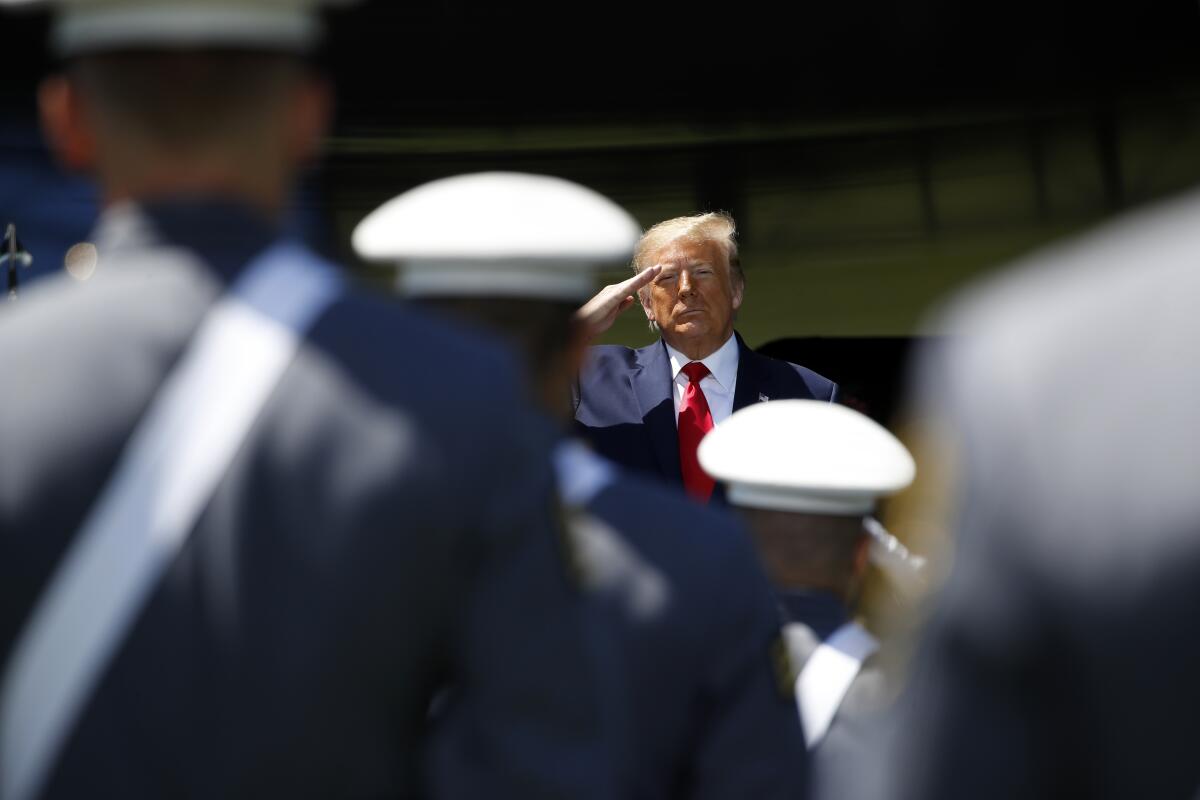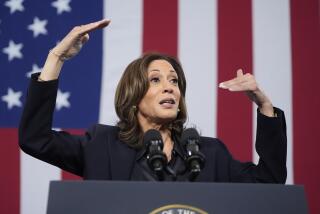Trump lauds military’s separation from politics days after aggressive protest response

WASHINGTON — President Trump told graduating West Point cadets on Saturday that America’s institutions are strongest when they steer clear of societal flash points — only days after pulling Pentagon leaders into a controversial photo op and stirring up arguments over the legacy of Confederate leaders on military bases.
But rather than renew those fights during his commencement address at West Point, Trump gave a fairly traditional 29-minute speech in which he said institutions endure by standing apart from “passions and prejudices of the moment” and that “when times are turbulent,” timeless values matter most.
The comments came a day after Trump abruptly moved the date of his first political rally in more than three months from June 19 to June 20. Trump announced the change on Twitter late Friday, a rare concession to critics who said it was tone deaf to hold a rally with Trump’s mostly white supporters on Juneteenth, which recognizes African Americans’ emancipation from slavery, in Tulsa, Okla., 99 years after a massacre that decimated that city’s Black community.
In Saturday’s commencement, Trump stayed almost entirely on script, praising the achievements of graduates, extolling the military’s history of bravery and valor and underlining the Army’s role “to preserve the republic, and the strong foundations upon which it stands: family, God, country, liberty, and justice.”

During his commencement address at West Point, President Trump said American institutions endure by standing apart from “passions and prejudices of the moment” and that “when times are turbulent,” timeless values matter most.
The speech itself was notable not only for Trump’s recent clashes with the military but also because it came months after the 1,107 cadets had been sent home to avoid spreading the novel coronavirus.
Many colleges and universities have greatly curtailed or canceled in-person graduation ceremonies as the risk of spreading the coronavirus pandemic remains high.
West Point cadets were called back to campus for the speech, which was delayed by a month, putting them at greater risk of contracting the virus and sparking criticism that they were being used as political props.
In addition to sitting apart from one another Saturday, the cadets received their diplomas without walking to the podium to greet Trump, offering the president a salute instead of a handshake as their names were read.
The commencement came days after the Pentagon’s top civilian and military leaders tried to distance themselves from their participation in Trump’s June 1 photo op, when National Guard troops and law enforcement using tear gas forcibly remove mostly peaceful protesters from Lafayette Square near the White House so he could appear with a Bible in front of a historic church.
The Lafayette Square incident threatens to damage the military’s traditional role as an apolitical force that focuses on defending Americans abroad rather than suppressing them at home.
Trump has sought to use troops to underscore his “law and order” message and tactics as Americans around the country, sparked by the killing of George Floyd by police in Minnesota, protest racial injustice and police brutality against African Americans.
Trump alluded to the role of Guard units deployed in Washington and other protest areas around the country, thanking “the men and women of our National Guard who respond with precision to so many recent challenges, from hurricanes and natural disasters to ensuring peace, safety and the constitutional rule of law on our streets.”
His only other political comments involved highlights of his own record, including increased spending on the military and the withdrawal of troops from abroad.
Gen. Mark A. Milley, the chairman of the Joint Chiefs of Staff, apologized Thursday for appearing with Trump at Lafayette Square, saying it created “the perception of the military involved in domestic politics.”
Defense Secretary Mark Esper, who also appeared with Trump, tried to distance himself as well by saying he did not support using the Insurrection Act to quell protesters, an option Trump had threatened. Esper also tried to mend the damage he did when he directed governors in a conference call to “dominate the battle space” against protesters, expressing regret for his choice of words.
The incident also prompted an unusually strong rebuke from former Defense Secretary James N. Mattis, a former Marine general who resigned from Trump’s Cabinet in December 2018, who accused Trump or ordering the military to “violate the constitutional rights of their fellow citizens.”
Trump was hardly chastened, however, loudly pushing back this week against initiatives from former and current military leaders as well as both Republican and Democratic lawmakers to rename military bases named for Confederate leaders who fought against the Union.
Pentagon leaders have been eager to show that they are sensitive to racism in the country’s institutions and said they were open to renaming the bases, but Trump often takes the other side of such charged debates, which political aides have said energize his largely white political base.
More to Read
Get the L.A. Times Politics newsletter
Deeply reported insights into legislation, politics and policy from Sacramento, Washington and beyond. In your inbox three times per week.
You may occasionally receive promotional content from the Los Angeles Times.











